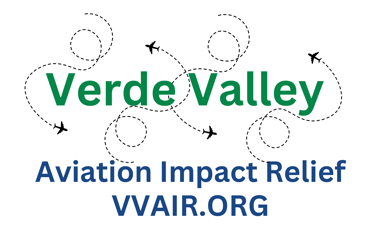Solutions
The most basic solution is to have all flight training activities cease at the Cottonwood Airport. The actual usage from the local planes that reside at the airport, and the infrequent traffic from visitors and medical/military aircraft, is extremely low, and not a strain on our communities. But, practically speaking, this is not likely because of growth in flight training, traffic pressures at Prescott Airport, flight costs, pilot preferences, and federal aviation law.
Building another airstrip to accommodate flight training has also been brought up as a potential solution. In January 2025, Embry-Riddle Aeronautical University claimed publicly at the Yavapai County Supervisors meeting that it is seeking to purchase land on the west side of Mingus Mountain to build an auxiliary airfield. To date, there have been no public updates to this claim and, so, no stated timetable for constructing such an airstrip. However any new strip could open only years down the road.
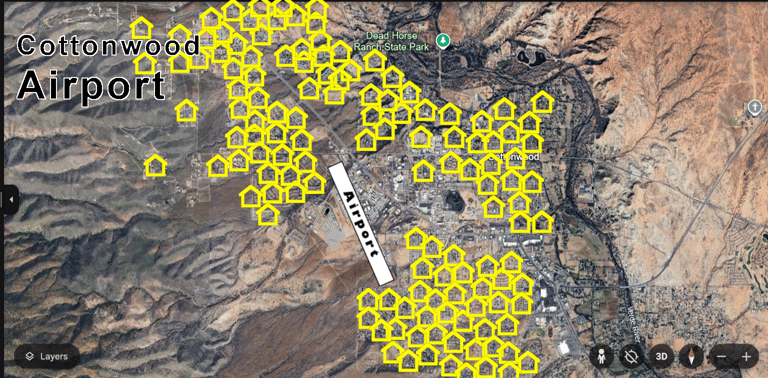

Cottonwood city, and the surrounding communities including the unincorporated portions of Cottonwood, the Towns of Clarkdale and Jerome, and Cornville, are all noise sensitive areas. These areas are dense with residential housing, parks, schools, national forests, rivers and creeks.
On the Airport Impact page, we referenced the FAA Advisory Circular 91-36d. This Advisory was created to "...encourages pilots making VFR flights near noise sensitive areas to fly at altitudes higher than the minimum permitted by regulation and on flight paths that will reduce aircraft noise in such areas."
"a. Avoidance of noise-sensitive areas, if practical, is preferable to overflight at relatively low altitudes."
It further states "Adherence to these practices is a practical indication of pilot concern for the environment, which will build support for aviation and alleviate the need for any additional statutory or regulatory actions."
"...an area is “noise-sensitive” if noise interferes with normal activities associated with the area’s use. Examples of noise-sensitive areas include residential, educational, health, and religious structures and sites, and parks, recreational areas (including areas with wilderness characteristics), wildlife refuges, and cultural and historical sites where a quiet setting is a generally recognized feature or attribute."
Embry-Riddle Aeuronautic University (ERAU), located on the other side of the Mingus mountains in Prescott, is the primary source of the Cottonwood Airport traffic. ERAU, as well as other training schools including Yavapai College, disregard this FAA noise advisory. In effect, these schools are teaching our future pilots to ignore the harmful effects of flight activity over and around these noise sensitive areas.
We know this because there are 3 additional public airports in the vicinity that are not noise sensitive areas (see images), and therefore would not be harmed by repetitive flight activity. Even though we have made numerous written and verbal pleas to ERAU, they continue to ignore our pleas and rarely use these other airports which can handle the entirety of the overflow training activity, while continuously and repeatedly using the Cottonwood Airport for their primary training activity outside of Prescott.
The FAA does not enforce this advisory, nor has it created any "statutory or regulatory actions", and therefore, ignoring this advisory is not illegal, which is why the response from Matthew Mitzmyer at the Yavapai College was "...the determination is that no illegal activity took place during the flight. The noise abatement program is voluntary at Prescott. Our students sometimes choose to land and train at other airports like the ones you mentioned, but it costs a lot more money and takes more time traveling to those places, so our students typically choose to train at P52 when they can't get training in at the Prescott airport."
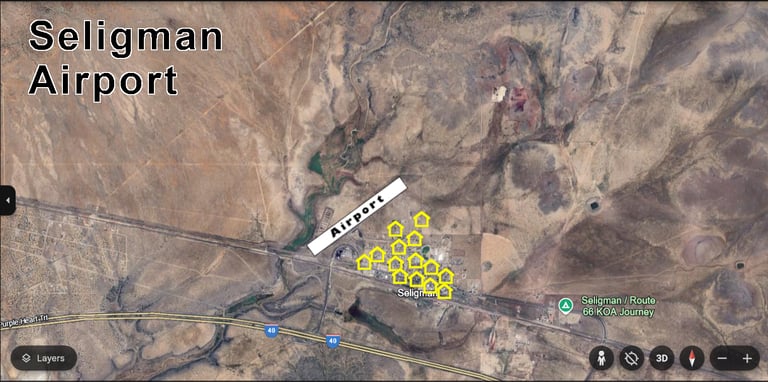

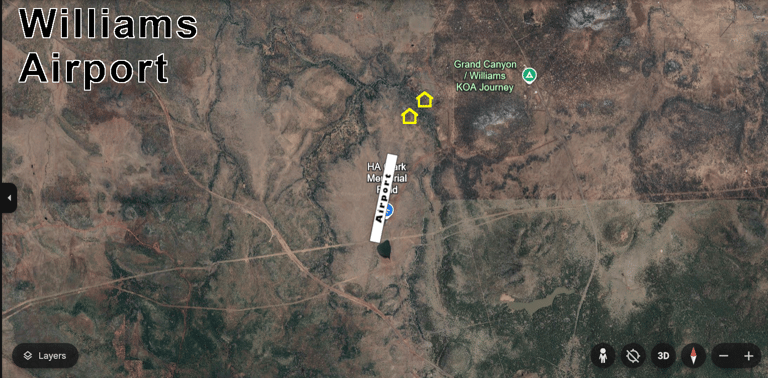

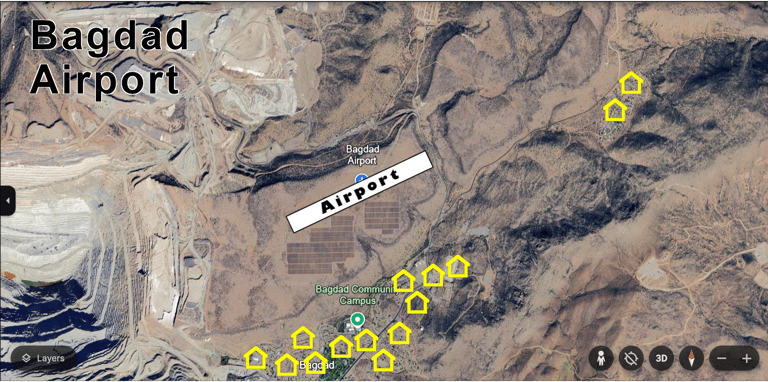

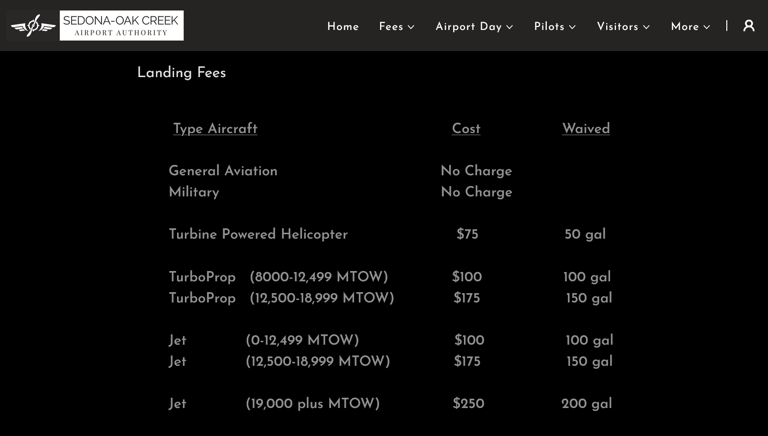

LANDING FEES
Currently, the Cottonwood Airport charges no fees for any landing activity at the airport. Every flight operation is free. Since the areas surrounding the Cottonwood Airport are noise-sensitive, it is reasonable to charge a fee for all of the flight activities that are interfering "with normal activities associated with the areas use". These fees can help to defray the costs of operating the airport, which is currently subsidized by the City, and deter the use of excessive activities when alternative and more appropriate airports are readily available.
Our neighboring airport in Sedona does charge landing fees. Their fee schedule has been simplified by charging flat fees for a class and weight category, rather than the more complicated fee schedule based on per 1000 pounds, which is common at many airports.
It would be ideal for the Cottonwood Airport to charge fees similar to the Sedona airport, and include commensurate fees of 25$ - $50 for smaller planes, down to 1000 pounds.
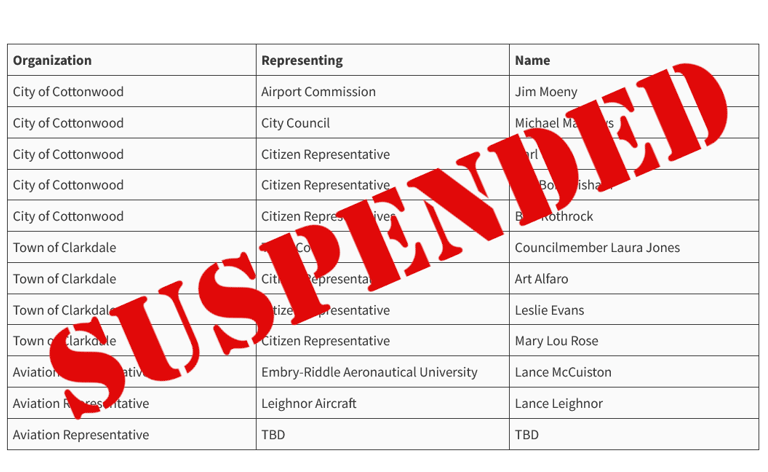

ADMINISTRATIVE SUPPORT
Finding support within the administrators and advisors of the airport is a significant step in resolving the impact issues of the airport, as the Cottonwood City Council is directly responsible for the operation and management of the airport. Some gains were made when the City Council created the Airport Noise Working Group, "to act in an advisory capacity to discuss, research, and provide recommendations to help mitigate community concerns related to airport operations and aircraft noise."
The Airport Noise Working Group was originally scheduled to meet monthly. However, at the third meeting on May 23, 2024, Cottonwood’s Deputy City Manager announced that the group would be suspended until a new airport manager was hired. Rodney Propst was appointed as the new airport manager in March 2025, however the meetings have not yet resumed.
Airport Noise Working Group Members
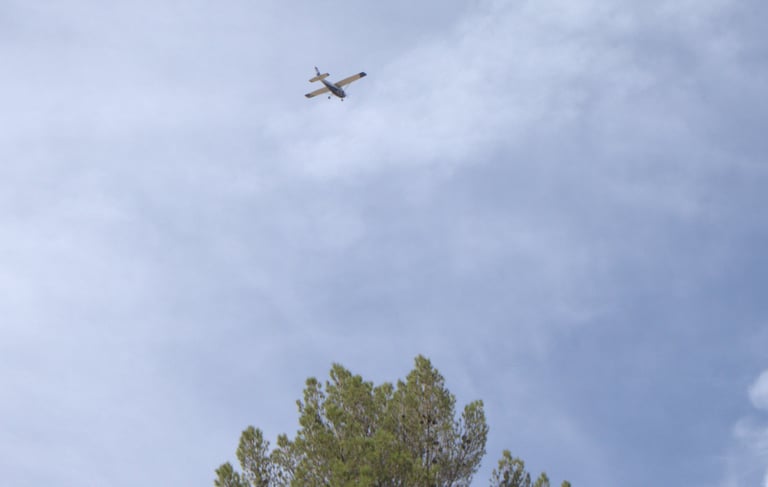

AIRPORT COMMISSION
As per the Cottonwood Code of Ordinances, "The [Airport] commission shall consist of five voting members. Four members shall be tenants/lessees of the Cottonwood municipal airport, or shall have a working knowledge of aviation matters and at least one of the four shall live within the city limits. One member should not be a tenant/lessee of the Cottonwood municipal airport, nor shall they be required to have a working knowledge of airport matters; they shall, however, be required to live within the corporate limits of the City of Cottonwood, and shall represent the general public interest."
Although it makes sense for this commission to be knowledgeable regarding the flight industry, it currently fosters a reluctant attitude to restricting, limiting or reducing the amount of training activity at the airport. Reform of the Airport Commission is one avenue for change. Such reform would involve a reconsideration of the composition of the group and the length and nature of its terms.
